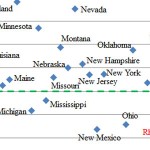Amazon, Cicilline, and Anti-Trust
One topic that John DePetro and I touched on during my weekly Tuesday-at-Two segment on his 1540 AM WADK show, but on which there’s more to say, was the matter of U.S. Congressman David Cicilline (D, RI) and his call for Congress to look into whether Amazon is entering into anti-trust territory with its purchase of Whole Foods:
Last week, Cicilline wrote a letter to Rep. Bob Goodlatte, R-Va., the House Judiciary Committee chairman, and Rep. Tom Marino, R-Pa., the chairman of the Subcommittee on Regulatory Reform, Commercial and Antitrust Law, asking them to look into the issue.
“People have a lot of anxiety about the creeping monopolies and mega-mergers that are giving consumers less and less power in the marketplace,” Cicilline said in an interview with “Closing Bell.”
He said it was not his intention to block the deal, but rather to explore the possible ramifications surrounding it.
Of course, one can judge the move as politics. As John and I discussed, this helps to keep Cicilline in the news looking Congressmanial (to coin a word) as his state looks likely to lose a Congressman and pit him against his colleague, Jim Langevin. Looking into multi-billion-dollar deals also brings the benefit of putting a politician in the midst of a lot of money on both sides of an issue, as corporations seek to buy influence.
But what about the issue itself?
It’s difficult to be too defensive of Amazon. After all, the company abandoned its online-retail fellows and volunteered to collect the Rhode Island sales tax earlier this year, just prior to announcing its purchase of Whole Foods, which would complicate the sales tax question. So now that it’s in the company’s interests to break the online protection from sales tax, it’s happy to abandon the issue and allow the door to close on its online competition.
In a more philosophical cast of mind, though, this is an Industrial Age–old question. To a point, consolidation and the merger of giants can create efficiencies and bring down prices, increasing the resources available in the system for other purposes. When consolidations and efficiencies start triggering monopoly dynamics, though, that flips.
In that context, it worries me that Cicilline is presenting Congress’s involvement as part of a need to revise anti-trust laws in the face of “automation and this new economy.” As incentive, I think that’s backwards.
The solution to the centralizing pull of efficiency isn’t to limit technology, but to free it up so that smaller players can find innovative ways to nip at the heals of the giants and keep them from locking up their advantages for all time. At the end of the above-linked CNBC article, for example, reporter Sarah Whitten mentions the shockwaves Amazon sent through Blue Apron when it gave indications of an intent to enter into the meal-kit business (in which consumers purchase all of the ingredients in a package to cook a gourmet meal at home). Amazon will obviously have advantages in this market, both as an online giant and as the owner of a grocery chain. What companies like Blue Apron need, therefore, is the ability to remain nimble in competing.
In other words, we need to turn back to sustained freedom, not government direction of our economy, and that isn’t an approach that anybody should expect from David Cicilline.


